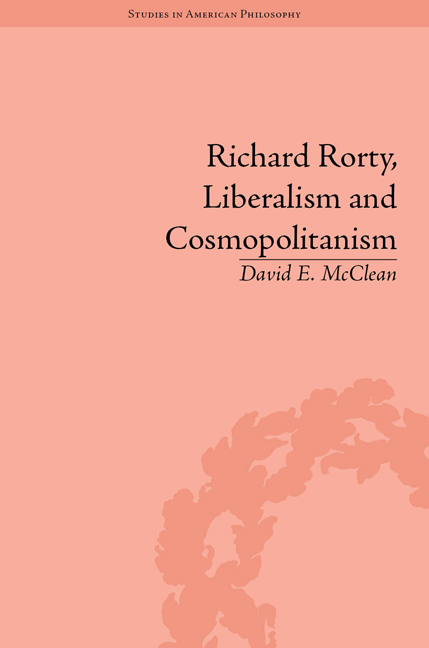Book contents
- Frontmatter
- CONTENTS
- Dedication
- Key to Works by Rorty
- Preface: Rorty's ‘Violence of Direction’
- 1 From Pragmatism to Rortyism
- 2 Alternative Utopias
- 3 Why Rorty Matters
- 4 Rorty on Religion, Race, Culture and Politics
- 5 Rorty and Cosmopolitanism
- Epilogue: Looking Forward to the Year 2096 with Cosmopolitan Hope
- Works Cited
- Notes
- Index
5 - Rorty and Cosmopolitanism
- Frontmatter
- CONTENTS
- Dedication
- Key to Works by Rorty
- Preface: Rorty's ‘Violence of Direction’
- 1 From Pragmatism to Rortyism
- 2 Alternative Utopias
- 3 Why Rorty Matters
- 4 Rorty on Religion, Race, Culture and Politics
- 5 Rorty and Cosmopolitanism
- Epilogue: Looking Forward to the Year 2096 with Cosmopolitan Hope
- Works Cited
- Notes
- Index
Summary
The subject of cosmopolitanism and Rorty's relation to it has been taken up piecemeal in the preceding chapters. What I would like to do now is discuss the importance of Rortyism's moral imagination and why Rorty's ceaseless reference to the reweaving and redescription of personal identities (as well as cultural ones) is central to any discussion of Rorty's relationship to cosmopolitan thought, although I do not endorse it without qualifications, as will be apparent in due course. In doing so, I will leave behind Rorty's recurring references to the ways that we should change the subject, away from anti-representationalism and anti-foundationalism, and focus more upon the upshot of his commitment to deflationism and ‘the conversation of mankind’. This moves us away from the academic philosophical debates concerning epistemology and its jargon (‘raw feels’, ‘anomalous monism’, ‘triangulation’, ‘the logical space of reason’, etc.), and into a language that is more apt for a discussion of moral and political imagination and human flourishing.
Rorty described himself as a radical deflationist, which I understand to mean that he was a radical cultural deflationist. This certainly did not mean that he believed that cultural commitments are irrelevant to identity. Clearly, given his version of ethnocentrism, he believed that there is nothing but culture to consult when trying to forge a plan of life for ourselves as individuals, or a safe, stable and just community for our families, friends, neighbors and fellow citizens of our various countries and, ultimately, of the world.
- Type
- Chapter
- Information
- Richard Rorty, Liberalism and Cosmopolitanism , pp. 137 - 174Publisher: Pickering & ChattoFirst published in: 2014

